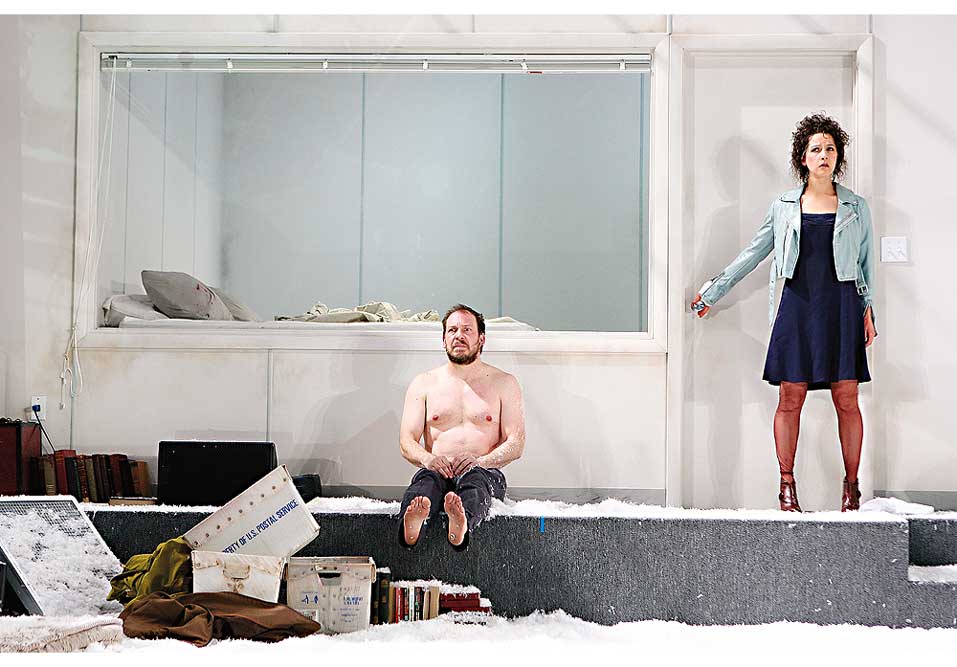CHALLENGE
To create a new-play program that doesn’t just commission writers but helps get their plays produced, both at Yale Rep and elsewhere.
SOLUTION
An endowment with an “enhancement fund” to encourage and facilitate future productions.
WHAT WORKED
More than 40 artists have been commissioned since 2008.
WHAT DIDN’T
The connection between the new program and the Yale School of Drama was weak.
WHAT’S NEXT
Increasing the number of workshops on campus; finding other ways to bring students and faculty on board.
When Yale Repertory Theatre hired Jennifer Kiger nine years ago, the institution already had a sterling reputation for producing new plays by the likes of August Wilson, Athol Fugard, Lee Blessing and Suzan-Lori Parks. But, as Kiger explains, she was brought on as associate artistic director in part “to create a formal program that would allow us to develop new work.”
Sounds easy enough. But, as managing director Victoria Nolan explains, creating a set-aside for new-play commissions and development was a daunting challenge. “We are deeply subsidized by Yale, but we didn’t have resources to create a program that would be robust and ongoing,” she says. New plays were not a strategic priority at the school, where issues like financial aid, artistic pay and buildings that “were state of the art for theatres in the 1800s” often took precedence.
Then, in 2008, Yale Rep got the boost it needed in the form of a three-year, $2.85-million gift from the Robina Foundation, created by the late James Binger, a Yale alumnus and owner of the Jujamcyn Theaters on Broadway. Kiger now heads up the New Plays Program at the Binger Center for New Theater. The gift was a large one, but Yale Rep decided to begin raising funds for an additional reserve, so the program could continue after the initial infusion expired; the Robina Foundation gave a supplementary gift in 2010, and the Andrew Mellon Foundation kicked in an additional $1 million that year.
But it was in 2012 that the Binger Center attained a shot at financial stability, a rarity in theatre. The Robina Foundation asked for a “transformative proposal,” Kiger says. The result: a donation of $3 million for operating costs and $15 million for endowments. Managing director Nolan says that given Yale’s 13.7-percent average rate of return on its endowment investments, the endowment should grow to hundreds of millions of dollars over the next three decades, while providing millions more for annual operations.
“We were really impressed with the quality of the process,” says Peter Karoff, who sits on the Robina board. “We were also drawn to the idea of investing in the creative experience. It is a very rare opportunity for a foundation.”
Many theatres commission new work, but the Binger Center stands out because of money dedicated to productions outside of Yale. As Yale Rep artistic director James Bundy explains, this goes back to the initial gift in 2008: $2.25 million was earmarked for the plays, with another $600,000 added for an “enhancement” fund—i.e., money specifically set aside to help other theatres produce the commissioned writers’ works, either as world premieres or after an initial production at Yale (in which case the other theatre would not have to pay Yale for the rights).

This emphasis on providing money not just for the writing but for productions, both at Yale and beyond, has been transformative. The more than 40 artists commissioned thus far at various stages of their careers—including Lucy Thurber, Sarah Ruhl, Branden Jacobs-Jenkins and Amy Herzog—have enjoyed productions not only at Yale but across the country.
“We try to be flexible,” Kiger says. “We start by listening. We give them the funding and the space to make the art they want, and we ask what else they need. We say, ‘What is the play you feel you must write next, or the risk or change you want to make?’”
Encouraging playwrights to take chances, Kiger says, can sometimes yield surprising results. Will Eno, for instance, decided he wanted to go outside his comfort zone by trying a naturalistic play. The result was The Realistic Joneses, which moved to Broadway after its New Haven run.
Other plays required big budgets or large casts, or presented more complex technical challenges than what many playwrights typically feel they can ask for. Examples include Robert Woodruff and Bill Camp’s adaptation of Notes from Underground, with its video projections; David Adjmi’s Marie Antoinette, with its lavish wigs and costumes; Rolin Jones’s These Paper Bullets!, a mashup of Much Ado About Nothing and Beatlemania, had a band on stage performing original songs by Green Day’s Billie Joe Armstrong.
The Binger Center’s answer to playwrights’ wildest dreams is, typically, to simply say yes. Each artist is treated according to his or her needs and desires, Kiger says—which can be shocking and unnerving for many. “It was surprising for me to see how much time and energy we have to put into building trust—they are just not used to this,” Kiger marvels.
Sheila Callaghan, whose Elevada premieres at Yale this season, says the faith the theatre has placed in her is astounding; she’s used to working in small theatres with accordingly small budgets. “It feels like such a gift, to have that money and support for a playwright from inception to production,” Callaghan says.
Woodruff adds that starting from inception means just what it says. “I had an idea based on a page-and-a-half of dialogue, so it wasn’t like I had to do all this work and then try to peddle it,” he says. “They are investing in people and their imaginations, and that is something extraordinary in theatre.”
Yale, like many theatres with commissioning programs, can’t put on every show it commissions—especially now that Kiger is tapping five to eight playwrights a year. That’s where the enhancement fund comes in. “If we are committed to creating new works, then we must make sure they are produced,” Kiger says flatly. “Otherwise it’s all just an exercise. So the enhancement fund is a real boon.”
Bundy calls the enhancement fund the “most variegated element” of the program, because it can be used in different ways to help bring a play to life. A play with a cast of four that transfers to New York may not need money to be staged again elsewhere—but a cast of 12 in period costumes can limit a play’s future prospects. One theatre wanted to add two new songs for a musical commissioned by Yale Rep, and the fund covered fees for arranging them; another needed funding for extra rehearsals. Your typical play commission wouldn’t cover any of that.
So while a Yale Rep production on your résumé may interest other theatres in your daring new play, the enhancement fund actually encourages them to take a chance on it.
The Binger Center program is still evolving, thanks in part to a built-in review of the program by experts in the field that will occur every five years. The Robina’s Karoff says the first review revealed that while “the primary goal was accomplished,” there was more work to be done, especially in connecting the program to the School of Drama.
Some of the disconnect was simply logistics—if the playwrights prefer to be in New York, or if they want workshops or readings either in private or with New York actors, then the center has sought to accommodate them, especially since Yale Rep has a perpetual space crunch with its own stages.
But Bundy, who is also the school’s dean, says steps have been taken—Kiger is teaching in the playwriting program, and last year, a reading of a musical on the campus was opened to the schools’ students. This year and next, Yale Rep is producing five plays instead of six per season, opening up rehearsal space. “As we revitalize our facilities there will be even more space here,” Bundy adds.
The ongoing internal review is especially important, because this gift will keep on giving, says Nolan. “The next generations will have the flexibility to grow and will have the capacity to truly lead the field,” she says. “That could mean having 15 writers on full-time salaries around the world—who knows?”
Whether other foundations and institutions can replicate this model in its approach or its scope remains to be seen. Karoff says he has received inquiries from theatres and donors, which he takes as a good sign. “This did send a really strong message that more can be done in supporting plays and playwrights,” he says.
Arts journalist Stuart Miller writes regularly for this magazine.


